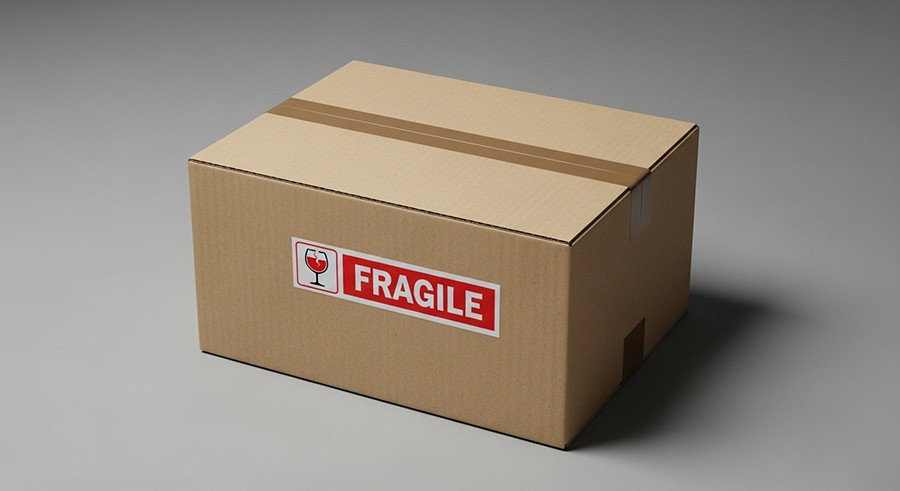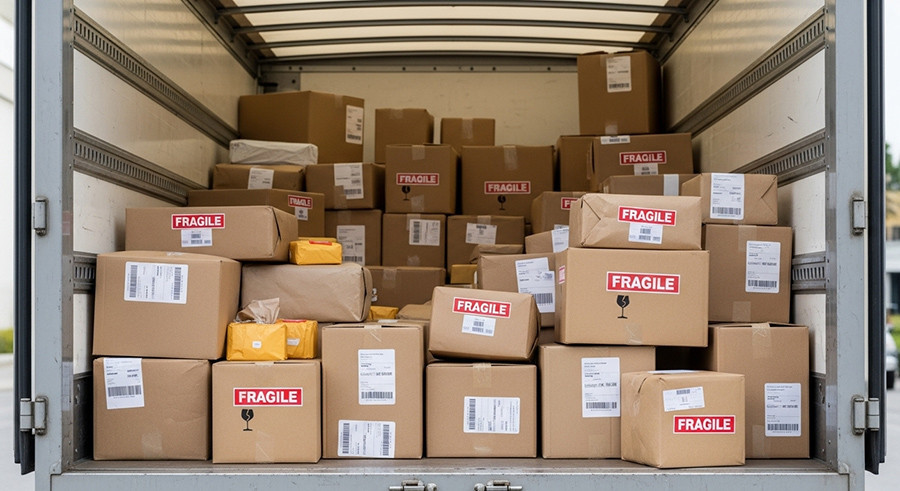The Best Couriers For Fragile Items
Finding the right courier for fragile items is possible if you follow explicit packing rules. Many UK couriers exclude compensation for classic breakables, such as glass and ceramics, so it’s essential to minimise the risk of rough treatment and plan for inevitable bumps in the road.
Major parcel networks use efficiency-first routes, which means your parcel will inevitably experience drops, vibration and stacking pressure. It’s for this reason that courier guidelines insist on methods like double-boxing and generous cushioning.
Selecting the right service model can also cut risks. One-hour delivery windows (like those offered by DPD), collect-and-hold locations (UPS Access Points), and dedicated vehicles can eliminate hub handling.
What counts as ‘fragile’?
When you’re shipping items, for personal purposes or as a business, ‘fragile’ covers any item that would be easily damaged by routine parcel handling.
Common examples include glass and crystal (bottles, frames, mirrors, for example), ceramics or porcelain, screens and electronics, musical instruments and artwork. Even materials that are considered ‘tough’ can qualify.
An example is cast iron, which is both heavy and brittle, and capable of breakage with a short drop. While automated postal hubs take great care to ensure the safety of packages, along the way, they’ll likely face:
- Drops/shocks from handling
- Vibration from conveyors
- Travel in vans/aircraft
- Compression/stacking forces

That’s why, in our packaging guide, we emphasise the importance of designing packages to withstand those stresses, rather than relying solely on the assumption of careful hand-carrying.
Breaking down the best couriers for fragile items
1. Royal Mail (good for small, well-packaged fragile items)
Royal Mail publishes clear guidance for delicate items and accepts many ‘fragile’ packages, provided you follow their instructions to the letter. Compensation is available for eligible services; however, it hinges on compliant packaging and product type, so always consult policy pages before posting.
2. FedEx / TNT (strong for international shipments)
FedEx explicitly requires fragile items and electronics to be packaged per its guidelines. Damage claims can be refused if the packaging is deemed insufficient. FedEx absorbed TNT in Europe in 2022, so shippers should be mindful that where TNT still appears via brokers, you’re effectively using FedEx’s network/terms.
3. UPS (reliable global network)
UPS is a suitable courier for fragile items, particularly when missed deliveries are a risk. With UPS Access Points, you can pick up parcels at a time and place that suits you while reducing repeat van journeys (and handling).
As with any service, be sure to check prohibited/restricted lists (e.g., some liquids in glass by air) and follow UPS’s specific packing rules.
4. DPD (precise home delivery windows)
As a courier for fragile items, DPD is known for minimising failed drop-offs and reroutes by sending one-hour Predict notifications (via app/SMS/email): useful for well-boxed electronics and similar fragile items. Again, reroutes depend on packaging meeting DPD standards, and some items are prohibited/limited, so review their lists before sending.
5. Evri formerly Hermes (budget-friendly)
Evri, well-known for carrying many everyday items, excludes a number of fragile categories from compensation if damaged in transit (e.g., any glass items or fragile items that contain glass parts). If you intend to send non-glass fragile items via Evri, follow their packing tips closely.
6. DHL (clear guidance on packing)
DHL’s public advice is very specific: they recommend double- or tri-wall cartons for fragile/heavy items, and this advice is worth following regardless of the carrier. For exporting, pair this with the right DHL services.
7. Parcelforce
As a trusted courier for fragile items, Parcelforce includes standard cover on many services but excludes compensation for items inherently prone to damage, including glass and ceramics. For non-glass fragiles, Parcelforce is a dependable option.

Compare courier rates with ParcelBroker!
Once you’ve decided the right courier for fragile items (fewer touchpoints, clear delivery windows, or even a dedicated vehicle), you can compare live UK quotes (including all charges) in one place.
See instant prices from leading carriers side by side (DPD, DHL, UPS, Parcelforce, FedEx/TNT, plus pallet networks), then select the speed and cost that suits your shipment.
Frequently Asked Questions
1. Can I send fragile items internationally?
Yes, so long as the item isn’t on a carrier’s prohibited or restricted list for the destination, and you complete the right customs forms.
Always check the carrier’s restricted items (for example, liquids in glass containers may be limited by air) and pack according to the carrier’s specific guidelines.
2. What is the best way to transport fragile items?
Ideally, shippers need to match the service model to the risk. For high-value, delicate items, consider a dedicated, same-day vehicle so that your parcel travels point-to-point.
Are you sending boxed fragiles to homes or businesses? Services with precise delivery windows will cut extra van journeys. International shipments will benefit more from major integrators, such as UPS, DHL or FedEx.
3. Do I need to insure my fragile items?
Insurance (also known as enhanced compensation) is sensible only if your contents are eligible for coverage. Many UK services exclude compensation for classic breakables like glass and ceramics, even if they accept the parcel.
4. What is the best way to package fragile items?
Rather than relying on common sense, we recommend following the advice of the courier you plan to use for shipping.
5. How can I make sure my package is handled carefully?
Prioritise packing (it really does make a difference) and photograph your parcel before sending it in case you need to make a damage claim.